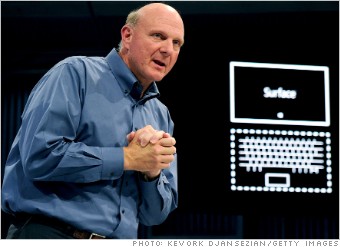

Management missteps and a failure to adapt to a changing tech landscape has put these seven big-name CEOs in the crosshairs.

Microsoft's chief was one of just two CEOs to survive CNNMoney's 2011 Hot Seat list -- six of the eight featured executives stepped down, got fired or retired -- and Steve Ballmer is the only return guest on our 2012 list.
He's heading into a make-or-break year.
Microsoft unleashed a blizzard of products in 2012, including the mega-launches of Windows 8, a radically redesigned PC operating system, and Surface, the first PC tablet of Microsoft's own design. It also unveiled Windows Phone 8 and Windows Server 2012. There were exciting new Xbox content announcements, an acclaimed Bing redesign with a marketing campaign that showed real muscle, and a revamped Office 2013 that finally starts to get elements of Microsoft's top product on to some mobile devices and tablets.
Microsoft (MSFT) proved that it could make bold, risky choices. For the first time in recent memory, it seems to have a real strategy for challenging Apple (AAPL) and Google (GOOG).
But as much as 2012 was good for Microsoft, it wasn't a particularly good year for the man at the top. A scathing report on Ballmer's tenure published by Vanity Fair in August painted a portrait of a CEO who let Microsoft fall far behind rivals it was once poised to stomp out. It also describe a cancerous corporate environment filled with infighting and a habit of quashing any new products that could cannibalize Windows or Office sales. (Fortune had a similar take in a 2011 story on Ballmer's rocky run.)
Ballmer's leadership was again called into question when European regulators blasted Microsoft for violating the terms of an antitrust settlement. In a software update, Microsoft left out a browser choice screen it was legally required to show. The omission was a mistake, Microsoft said, but it could be an expensive one: The company faces up to $7 billion in penalties if regulators decide to play hardball.
Meanwhile, the stock continues flatlining. Microsoft's share price has not budged in over a decade.
Microsoft executives say the company has learned from its missteps and is entering a new era. They also consider the criticism overblown.
"Microsoft is the third most valuable company in the world, with a market capitalization around $250 billion and an incredible pipeline of products and services," company spokesman Frank Shaw wrote in a response to Vanity Fair. "A lot of companies would like to have that kind of lost decade."